This is the very briefest of overviews that covers centuries - and really does not do it justice - at all - as a historical piece.
In the context of 'the history of banking and finance', it does offer the foundations to the next part of the story....
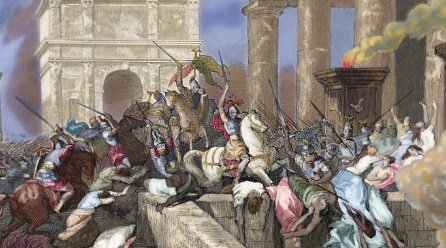
With the splitting into two of the once unified Roman Empire,
the organized 'money economy' of the Rome Empire, disintegrated.
The Early Dark Ages, (the age of migration).
For a period of around three centuries after the decline of the Roman Empire, Europe descended into a state of flux.
Coins that was once the legal tender throughout the known western world became defunct.
People traveled all over Europe during this time of structural decay, and conflicts between various tribes vying for power was a constant threat.
Money was replaced by the bartering system as the common day-to-day means of exchange.
'Taxes' going to the local warlords were paid with goods (food and clothing).
Only the larger transactions of the day (between warring fiefdoms, mostly) were conducted in silver and gold coins.
The breakdown of economic and social infrastructure resulted in increasingly localized economies, mostly because it became unsafe to travel or carry goods over any great distances.
Thus, there was a massive collapse in trade.
Major industries that depended on safe movement of goods, vanished almost overnight.
This newly developing structure - Feudalism - was a social, political and economic system that flourished for centuries.
Feudalism is a system based on the holding of land, with a centralized authority (barons, chiefs, kings) overseeing it. Populations living on this land were bound to it, and required to pay 'tax' for making a living from it.
In the dark ages (the early middle ages), feudalism was only just starting to take a hold as the movements of people slowed down.
The vacuum left by the decaying structures of Roman bureaucracies, law, and occupation, was being filled..
Population sizes declined dramatically over this period.
Some historians have suggested a total European population loss of 50 to 60 per cent between 541 and 700.
(the causes of this were many, and not relevant to this post - but I might post more about this separately, as it was a fascinating, complex , period in history).
Trade did continue, but it was at a very much reduced volume.
Spanning over a period several centuries, Christianity spread throughout much of Europe, and the Papacy evolved into a powerful political entity.
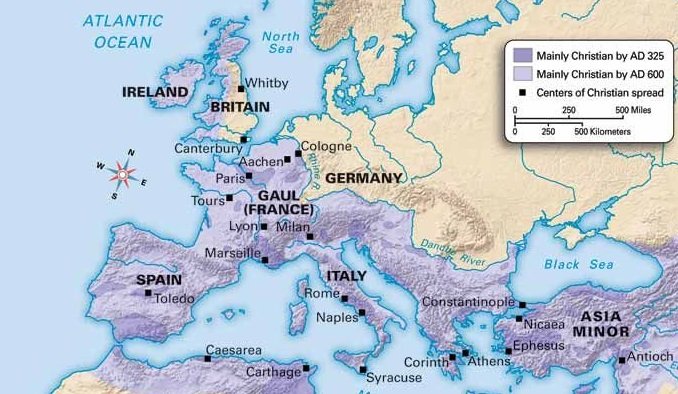
This was when larger kingdoms started to take form, made up of several feudal lords making alliances with each other.
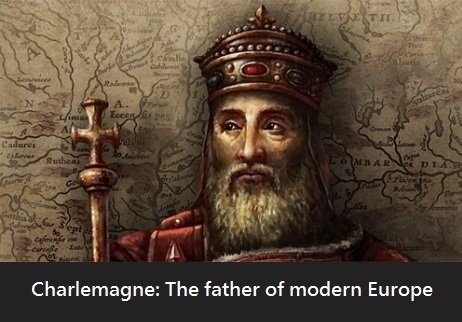
Charlemagne. (748– 814).
Charlemagne was the King of the Franks and the Lombards (today's northern Italy and modern day France).
During the early middle ages, he united the majority of western and central Europe.
He was the first recognized emperor to rule in western Europe, since the fall of the Western Roman Empire. (three centuries earlier).
As the sole ruler of this area, and also a christian, he became protector of The Papacy.
He reached the height of power in 800 and was crowned "Emperor of the Romans" by Pope Leo III on Christmas Day.
Charlemagne has been called the "Father of Europe".
Charlemagne’s reforms of the coinage system formally began the age of silver money.
In the year 794 he fixed the value of the pound at 491 grams of silver.
...From then on, a pound of silver was divided into 20 shillings of 12 pence (denarii) each.
This was a system which survived in Britain - until 1971!
Britain, and the (first) Bank of England...
There were seven autonomous kingdoms of the Anglo-Saxon Heptarchy in the early middle ages.
'The Heptarchy' is a collective name given to the seven kingdoms of Anglo-Saxon England from the Anglo Saxon settlements of Britain in the 5th century, until the consolidation of 'the four kingdoms' - Mercia, Northumbria, Wessex and East Anglia - in the eighth century.
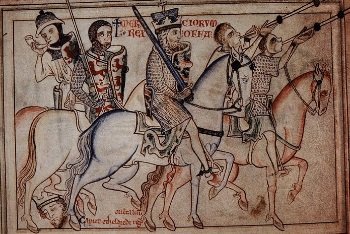
King Offa ruled the Kingdom of Mercia.
King Offa established the first monetary system in England.
The scarcity of gold at the time, meant that he used silver for coinage - and as a store of wealth.
The standard unit of exchange was a pound of silver divided into 240 pennies (see Charlemagne, above).
British pennies were stamped with a star. (the old English word 'stearra' - and from which the word 'sterling' is derived from).
Usury.
King Offa introduced a statute prohibiting usury - i.e the charging of interest on money that's lent.
These laws against usury were further extended by King Alfred (865-99). He directed that the property of usurers be forfeited.
In 1050, Edward the Confessor (1042-66) decreed not only forfeiture of their property, but that they be declared an
outlaw, and be banished - for life - from the kingdom.
1066 A.D. The Duke of Normandy, and the return of usury...
'William the Conqueror' was born (illegitimately) as 'William the Bastard'
He invaded Britain in 1066, hoping to take the kingdom for himself, and proclaim himself The King of England , by defeating King Harold II at Hastings, he was victorious and thus claimed the title.
His military operations were in some large part, financed by the Jewish money lenders that were based in Rouen (France).
A Jewish migration to England, from France, came in the wake of The Battle of Hastings.
For the financial support offered by the money lenders, 'William The Conqueror' richly rewarded them.
How?
By being allowed to practice usury under royal protection.
The consequences for the English people were dire.
Interest of 33% per annum were charged on lands mortgaged by nobles, and 300% per annum on tools of trade that were needed by workmen.
The result of this 'protected business' of usury?
Within two generations, one quarter of all English lands were in the hands of the usurers.
The activity of the usurers in England from the eleventh century onwards sucked up all the wealth of the land thereby hindered all economic development.
*** from an anthropological/philosophical perspective ( as I've said before) , I see this as an example of a small, insular community with higher IQ's, exploiting a situation to their advantage.
As I've also mentioned , it seems to me that this dynamic - which has been seen in many cultures - is a result of moral and ethical codes that are held within a small insular community not working in sympathy with the wider moral and ethical codes that are exhibited that the wider community . (Communities in which 'the insular community' themselves, reside).
Examples of this can be seen all over the world today, be it religious, financial, or cultural in nature.
The dynamic remains the same, the apparent reason for the conflict, is secondary. The cause is a misalignment with local values.
By the turn of the 13th century many nobles were in danger of losing their lands - mainly because of usury and government taxation.
Nobles who borrowed from moneylenders (and also from the King and his agents) had to have their mortgages registered on the Treasury Rolls.
As soon as a noble got into any financial difficulty, the King
would buy the debt from the moneylender and seize the land for himself!
While politically and economically astute, it was also reckless, shortsighted, and utterly dishonest.
King John (1199-1216) was 'in the pockets of' the money lenders.
In 1215 the nobles revolted and forced King John to sign the Magna Carta on 15 June 1215.
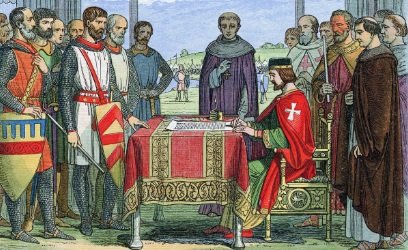
This document consists of 61 clauses relating to the establishment of various constitutional and legal rights.
The principal purpose for the magna carta , was to cancel the bonds of the moneylenders and to abolish usury.
19 of the clauses affecting the moneylenders privileged positions, were abrogated the following year (after the kings death).
However , in 1233 (and 1275) Statutes of Jewry were passed , which abolished all forms of usury.
King Edward (18th July), 1290 compelled the entire Jewish population (16,511 people) to leave England forever.
Anyone of the Jewish community who remained after 1st November 1290 (All Saints Day) was liable to be executed.( which does seem a little harsh).
It's interesting to note that this is only one of dozens, of expulsions - that have been recorded in European history for the same reason.
Usury.
Unlike the modern practices of 'ethnic cleansing' the Jewish populations who were expelled, were free to leave - and with all their goods and chattels.
In part 5, the expansion of wealth...The height of the middle ages, and beyond.
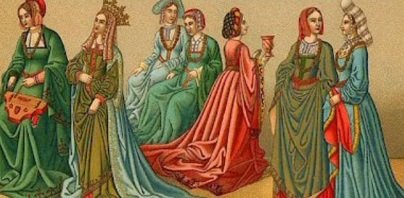
Posted Using LeoFinance Beta